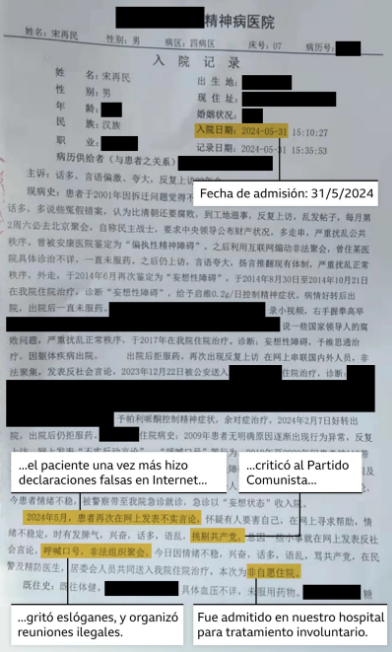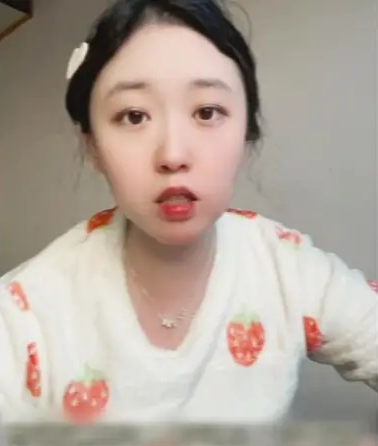Psychiatric hospitals where dissidents are silent


Jie Lijian tried to sue the police to change their medical history
Jie says he was arrested for attending a protest to demand better salaries in a factory.
He explains that the police interrogated him for three days before taking him to a psychiatric hospital.
Like Zhang, Jie says he was prescribed antipsychotic medications that affected his critical thinking. After a week at the hospital, he refused to take more medications.
After fighting with the staff and that they told him that he was causing problems, Jie was sent to electroconvulsive therapy (TEC), a method that consists of passing electric currents through a patient’s brain.
«The pain was from head to toe. I felt that my whole body was not mine. It was really painful. Electric downloads that went and went. I passed out several times. I felt that I was dying, ”he says.
He says he was discharged after 52 days. Now he has a part -time job in Los Angeles and is looking for asylum in the US.
In 2019, a year after when JIE states that it was hospitalized, the Association of Physicians of China updated its guidelines on the TEC, establishing that it should only be administered with consent and under general anesthesia.
We wanted to know more about the participation of doctors in those cases.
Talking with foreign media such as BBC without permission could cause them problems, so our only option was to act undercover.
We concert telephone consultations with doctors working in four hospitals that, according to our tests, are involved in forced hospitalizations.
We used an invented story about a relative who had been hospitalized for publishing anti -government comments on the Internet, and we asked five doctors if they had ever encountered cases of patients sent by the police.
Four confirmed yes.
“The psychiatric department has a type of admission called ‘rufflers’,” a doctor told us.
Another doctor, from the hospital where Junjie was held, seems to confirm his story that the police continued to watch the patients once they were discharged.
«The police will control you at home to make sure you take your medications. If you don’t take them, you could violate the law again, ”they said.
We got in touch with the hospital in question to ask for comments, but did not answer us.
We have had access to the activist’s medical records for Democracy Song Zaimin, hospitalized for the fifth time last year, which makes clear how closely linked political opinions seem to be with a psychiatric diagnosis.
«Today, I was … speaking a lot, speaking incoherently and criticizing the Communist Party. Therefore, he was sent to our hospital to receive hospital treatment from the Police, the doctors and the residents committee of his town. It was an involuntary hospitalization, ”says the history.

The medical records of the Song Zaimin activist show the close connection between political opinions and hospital admission
Possible abuse
We ask Professor Thomas G. Schulze, elected president of the World Psychiatric Association, to review these notes. He replied:
«From what is described here, no one should be involuntarily admitted and treated against their will. It smells like political abuse.
Between 2013 and 2017, more than 200 people denounced having been unfairly hospitalized by the authorities, according to a group of citizen journalists in China who documented abuse of the Mental Health Law.
His reports ended in 2017, because the founder of the group was arrested and subsequently imprisoned.
For victims who seek justice, the legal system seems to be against them.
A man we called Mr. Li, who was hospitalized in 2023 after protesting against the Local Police, tried to take legal actions against the authorities for his imprisonment.
Unlike Junjie, doctors told Li that he was not sick, but the police hired an external psychiatrist to evaluate it. The doctor diagnosed bipolar disorder and retained Li for 45 days.
Once released, he decided to challenge the diagnosis.
«If I do not denounce the police, it is as if they agreed to have a mental illness. This will have a great impact on my future and in my freedom because the police can use it as a reason to lock me at any time, ”he says.
In China, the records of any person who has been diagnosed with a serious mental disorder could be shared with the police and even with the local resident committees.
But Li was not successful: the courts rejected their appeal.
“We hear our leaders talk about the rule of law,” he tells us. “We never imagine that one day they can lock us in a psychiatric hospital.”
The BBC has found on the official page of Chinese judicial decisions 112 people who, between 2013 and 2024, tried to take legal actions against the police, local governments or hospitals for this type of treatment.
About 40% of these plaintiffs participated in complaints against the authorities. Only two won their cases.
And the page seems to be censored: five other cases that we have investigated do not appear in the database.
The problem is that the police enjoy “considerable discretion” when dealing with “uproarist,” according to Nicola Macbean, by The Rights Practice, a London human rights organization.
“Sending someone to a psychiatric hospital, skipping the procedures, is a tool too easy and too useful for local authorities.”

Chinese social networks | The publications of the Vlogger Li Yixue about its hospitalization after accusing the police of sexual assault have recently become viral in China
Now the attention focuses on the fate of the Vlogger Li Yixue, who accused a police officer of sexual aggression.
It is said that Li was recently hospitalized for the second time after his publications on social networks about that experience became viral. It is reported that it is now under surveillance in a hotel.
We have communicated the results of our investigation to the Chinese embassy in the United Kingdom.
Last year, the Embassy said that the Chinese Communist Party “reaffirmed” that it must “improve mechanisms” around the law, which, as stated, “explicitly prohibits illegal detention and other methods of illegally depriving or restricting personal freedom of citizens ».
(tagstotranslate) China
Source link




